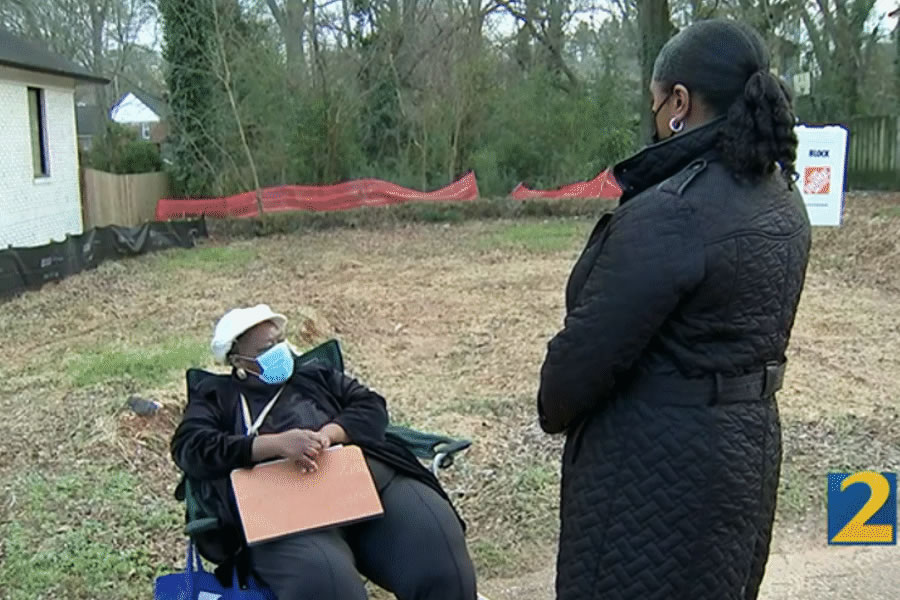Linda Willis’s home was recently stolen.
But it wasn’t carted off in the back of a truck. The thieves stole the legal title to Willis’s home by filing a fraudulent deed in her county’s real estate records. By transferring legal title to the home and reselling it to a third party, the thieves pocketed hundreds of thousands of dollars.
Ms. Willis is not guaranteed to get her home back. She spent 30 years working hard to pay off her mortgage to own it outright. The developer that eventually bought her home had already started tearing it down before Ms. Willis (who was living elsewhere while convalescing) realized that anything was wrong. And, now it is just an empty lot.

Local TV news coverage of Wilis’s story can be found here.
These fraudulent deed schemes arise most frequently in gentrifying neighborhoods in which ill or elderly residents may not be residing in their homes. Often these homes’ mortgages are paid off. Without a mortgage encumbering them, these homes are more easily fraudulently transferred without anybody noticing until it’s too late.
How can you protect your home or that of an ill, absent, elderly, or incompetent family member from such schemes?
Here are ten tips:
- Report the crime immediately.
- Take out a policy of title insurance.
- Register with the County Clerk’s fraud registry.
- Beware of solicitors.
- Run a title search.
- Retitle the property.
- Record a protective title affidavit.
- Know what you are signing.
- Sign deeds only in a lawyer’s office.
- Consider taking out a HELOC.
Report the Crime Immediately
If you think you have already been victimized, take immediate steps to alert the world. First contact law enforcement. Second, hire a real estate attorney. You may need to record a fraud affidavit in your county’s deed records, ideally with the help of an attorney. Time may be of the essence because if you fail to act quickly you could lose your right to recover your property from a potentially innocent third-party buyer who is unaware that your title may have been stolen. And, the thieves might get away if you don’t report quickly enough.
Take Out a Homeowner’s Policy of Title Insurance
Before a claim arises, take out an owner’s title insurance policy, ideally at the time of purchase. But note that an ordinary “Owner’s” policy of title insurance won’t cover claims that have already occurred and that could have been discovered before you took out the policy. An enhanced or “Homeowner’s” policy will cover claims, including forgery or impersonation, that may arise in the future. A Homeowner’s policy also typically costs approximately 20% more than a “vanilla” Owner’s policy. The premium might run a few hundred dollars more for a mid-range home. (Your mileage may vary.)
Register with the County Clerk’s Fraud Registry
Consider registering your property with the ‟fraud registry” of the Clerk of your County’s Superior Court. It will send an email when a deed is recorded that affects your property. But not all counties offer this service.
Beware of Solicitors
Be wary of anyone soliciting to buy your home out of the blue. An earnest or forceful solicitation should put you on guard. Take such precautions as installing a Ring doorbell or similar monitoring device. Criminals usually case properties before stealing them.
Run a Title Search
Have a prophylactic title search performed with the help of a specialized attorney. Checking the county tax assessor’s website can also permit you to confirm your property is titled correctly. Judgment and tax liens against someone with a name similar to yours might expose your property to being auctioned off without your even realizing it.
Retitle the Property
If you have a common name consider putting your full name on title or jointly titling with a spouse — with the aid of an attorney.
Record a Protective Affidavit of Title
With the aid of an attorney, consider recording an affidavit as to matters affecting title to declare your intention not to sell you home anytime soon, and maybe asking a title examiner to contact a specific, trusted person to confirm your wishes.
Know What You are Signing
Fraudsters are everywhere. One may entice you into signing documents that aren’t what you think they are. Many of these perpetrators might be members of your church or friends of friends who spend time “grooming” you or ingratiating themselves with you.
Sign Deeds in an Attorney’s Office
Only sign a deed to property — including a mortgage, security deed, reverse mortgage, line of credit, and the like — in an attorney’s office. Avoid participating in a remote (i.e., “zoomed”), e-signed, or ‟drive-by” closing. Remember that closing attorneys don’t usually represent the seller of property. They typically represent the lender financing the transaction, or possibly the buyer. Have your own attorney with you to review the closing documents. And, keep a copy of any document you sign before you leave.
Consider Taking Out a HELOC
After checking with your own attorney or financial adviser, consider taking out a small Home Equity Line of Credit (“HELOC”) with a legitimate bank as a line of defense. But carefully consider whether this may negatively affect your credit or be used to steal your equity. (It’s a common means of theft by unscrupulous insiders or even family members.)
